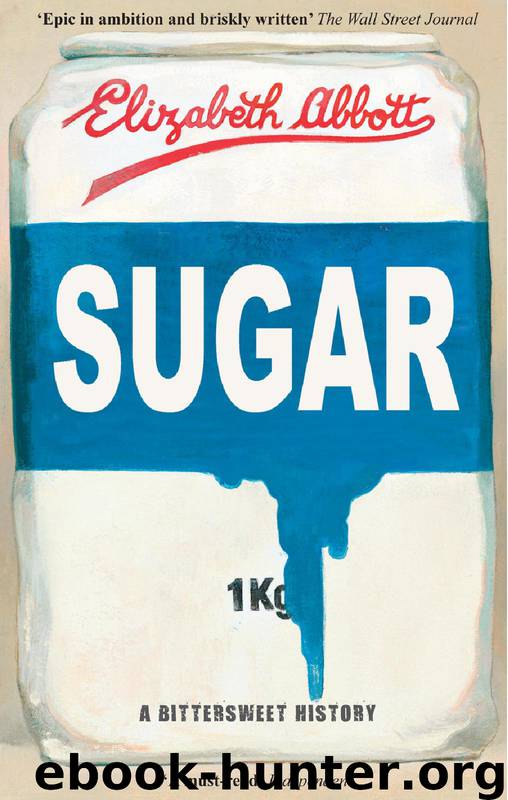Sugar by Elizabeth Abbott

Author:Elizabeth Abbott [Elizabeth Abbott]
Language: eng
Format: epub
ISBN: 9780715640340
Publisher: Gerald Duckworth & Co Ltd
Isaac Cruikshank’s savage cartoon of Captain John Kimber as he prepares to punish an enslaved African teenager too sick to eat by whipping her upside-down. The woman later died.
The published testimonials of African victims of the slave trade were especially powerful, and Equiano’s The Interesting Narrative of the Life of Olaudah Equiano, or Gustavus Vassa, the African (1789) and Cugoano’s Thoughts and Sentiments on the Evils and Wicked Traffic of Human Species (1787) generated intense interest. Sancho’s Letters of the Late Ignatius Sancho, an African, published posthumously in 1782, were said to prove that “an untutored African may possess abilities equal to an European.”411
Equiano promoted his seven-shilling pamphlet so ably that, for five years, he traveled throughout Britain on what historian Adam Hochschild styles “the first great political book tour.”412 His narrative, in some respects modeled on The Life and Most Surprizing Adventures of Robinson Crusoe (1719), appealed to intellect as well as sentiment. His fears that his white captors intended to stew and eat him reversed cultural notions about cannibalism. Equiano also accused planters, greedy for cheaply produced sugar, of destroying Africa’s rich and peaceful societies.
Cugoano’s account, edited by Equiano, described how the “browfow, that is, the white-faced people,” took him from Africa to Grenada and how, during the Middle Passage, “it was common for the dirty filthy sailors to take the African women and lie upon their bodies.” On a Grenadian sugar plantation, Cugoano saw “most dreadful scenes of misery and cruelty … for eating a piece of sugar-cane, some were cruelly lashed, or struck over the face, to knock their teeth out.… Some told me they had their teeth pulled out, to deter others, and to prevent them from eating any cane in future.” Cugoano was the first African to propose “a total abolition of slavery … an universal emancipation of slaves” and an immediate end to the slave trade.413
Abolitionism—and the West India Interest—spewed out advertisements, newspaper articles, letters to editors and pamphlets. Abolitionists lobbied editors and worried that the West Indians and their allies were resorting to bribery or intimidation to have editors exclude abolitionist articles or letters from their newspapers. To persuade editors to support abolition, Clarkson traveled with a grim show-and-tell, a set of implements sold in Liverpool shops for use in the slave trade: handcuffs, shackles, thumbscrews and a tool to pry open the mouths of slaves attempting suicide by starvation.
Download
This site does not store any files on its server. We only index and link to content provided by other sites. Please contact the content providers to delete copyright contents if any and email us, we'll remove relevant links or contents immediately.
| Culinary Biographies | Essays |
| Food Industry | History |
| Reference |
A Court of Wings and Ruin by Sarah J. Maas(7847)
The Death of the Heart by Elizabeth Bowen(3622)
Better Homes and Gardens New Cookbook by Better Homes & Gardens(3595)
The Sprouting Book by Ann Wigmore(3592)
BraveTart by Stella Parks(3449)
Salt, Fat, Acid, Heat: Mastering the Elements of Good Cooking by Nosrat Samin(3147)
Sauces by James Peterson(3099)
Kitchen confidential by Anthony Bourdain(3090)
The Bread Bible by Rose Levy Beranbaum(3071)
Classic by Mary Berry(3014)
Solo Food by Janneke Vreugdenhil(2976)
Ottolenghi - The Cookbook by Yotam Ottolenghi(2946)
Martha Stewart's Baking Handbook by Martha Stewart(2860)
Day by Elie Wiesel(2783)
Betty Crocker's Good and Easy Cook Book by Betty Crocker(2724)
My Pantry by Alice Waters(2621)
The Plant Paradox by Dr. Steven R. Gundry M.D(2620)
The Kitchen Counter Cooking School by Kathleen Flinn(2520)
Hot Sauce Nation by Denver Nicks(2495)
